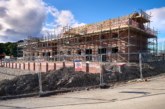 Brian Berry, Chief Executive of the FMB, discusses how Brexit could impact the building sector.
Brian Berry, Chief Executive of the FMB, discusses how Brexit could impact the building sector.
The UK is set to leave the EU but, at the time of writing, we are still very much in the dark as to what our future holds post-Brexit. It is crucial that the Government secures a deal with the EU for an orderly exit, and a transition period that gives businesses the certainty they need.
If we leave the EU without a deal, the cost of key materials from the EU are likely to increase due to potential tariffs and barriers to trade. It is estimated that a quarter of materials used in UK construction projects are imported and that 62% of these imports come from the EU – the top three being electrical wire, lamps and fittings, and sawn wood. The Construction Products Association has reported that a no-deal Brexit would lead to a double-digit rise in prices for imported products.
Barrier free access
The Government should ensure continued barrier-free access to imported goods, not just tariff-free. Physically slowing down goods by completing necessary checks at the border for appropriate paperwork raises the prospect of big delays and builders being without the materials they require to press on with projects. By and large, stocks of materials are not held by construction companies with materials being delivered as and when they are needed on site. Most firms don’t have space to stock pile materials.
Finally, deal or no deal, it’s crucial for the construction sector that the post-Brexit immigration system reflects the needs of the industry. If our access to skilled EU workers of any levels is significantly reduced, as is currently proposed, skills shortages will further intensify. We therefore need an immigration system that allows us to draw on significant numbers of EU workers of all skill levels. Getting this right is within the Government’s gift regardless of what happens during the latest round of negotiations with the EU regarding Brexit itself.









